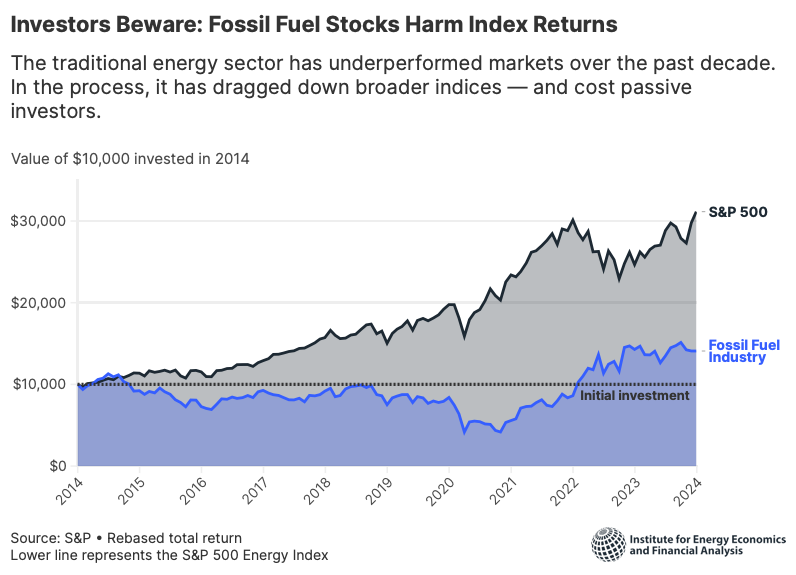Financial rationale for investing in fossil fuel industry continues to unravel

In 2023, the fossil fuel sector once again lost ground compared to the market as a whole. As oil majors report a 30% decline in annual profits and the sector posts an annual loss of almost 5%, a new report by the Institute of Energy Economics and Financial Analysis (IEEFA) finds that it wasn’t just a bad year to invest in fossil fuels—but a bad decade.
Fossil fuel stocks have dragged down stock market returns over the last 10 years, according to a new IEEFA report, Passive investing in a warming world. This pattern broadly holds despite the fossil fuel sector’s profits in the wake of the COVID-19 pandemic and the war in Ukraine. Meanwhile, fossil-free equity indices are gaining market adoption and proving to be better investments. As the long-term outlook for fossil fuels remains negative, a broader market evolution away from carbon continues, and investors should take note.
“The era of stable, blue-chip returns from the fossil fuel sector is long gone,” said Dan Cohn, IEEFA energy finance analyst and co-author of the report. “Now, every major investment house has developed investment products with sustainable mandates. These mandates reflect the fossil fuel sector’s underperformance, its negative long-term outlook, and increasing demand for investment products with dramatically less or no fossil fuels.”
The report identifies a counterintuitive opportunity for institutional investors who invest in passively managed equity strategies, which attempt to replicate index returns rather than beat them. Although conventional wisdom holds that excluding any stocks reduces returns from passive portfolios, the opposite has been true in the specific case of fossil fuels during the past decade—limiting fossil fuel exposure has improved returns.
“Disruption and destabilization in fossil fuel commodity markets, competition from renewable energy, the electrification of transport, and growing investor consciousness of climate change’s financial risks are driving investors to re-evaluate fossil fuels’ place in the portfolio,” said Connor Chung, IEEFA research associate and co-author of the report. “As the economies of the past and the future collide, the fossil fuel sector is not prepared to manage the challenges of the coming decades. Investors have a responsibility to act.”
The report finds that a wide variety of equity indices are now available in fossil-free versions, including marquee indices like the Standard & Poor’s 500, the Russell 3000, and the MSCI All-Country World Index, as well as indices that focus on developing or emerging markets, specific geographies, and mid- and small-capitalization stocks.
Responding to financial risks is not optional, and trustees should assess whether fossil fuel holdings remain compatible with the standards and goals of their funds.















